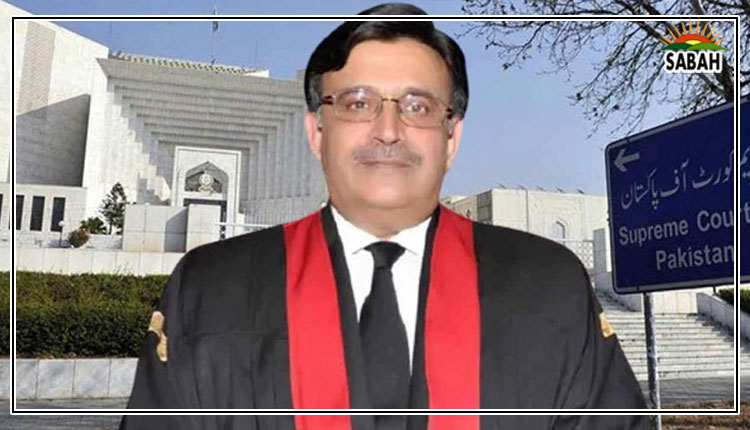CJP Umar Ata Bandial asks Election Commission of Pakistan why it was consulting with Punjab governor on election dates
ISLAMABAD, Feb 15 (SABAH): Chief Justice of Pakistan Justice Umar Ata Bandial on Wednesday asked why the Election Commission of Pakistan (ECP) was consulting with the governor on dates for the Punjab Assembly elections as the court heard petitions filed by dissident PTI MPAs against their disqualification.
The ECP had disqualified 25 dissident MPAs of the PTI on May 20, 2022 on the grounds that they had voted for PML-N’s Muhammad Hamza Shehbaz Sharif in the election for Punjab chief minister against the party line and defected.
The disqualified MPAs then petitioned the Supreme Court against the move and the ECP through Chief Election Commissioner (CEC) Dr. Sikandar Sultan Raja, PTI chairman Imran Khan and the PTI’s parliamentary leader in Punjab before it was dissolved, Muhammad Sibtain Khan, were cited as respondents in the petition.
A three-member Supreme Court bench — consisting of the CJP Umar Ata Bandial, Justice Mrs. Ayesha A. Malik and Justice Athar Minallah — heard the PTI MPAs’ pleas on Wednesday and dismissed them for being “ineffective”.
During the hearing, the pending Punjab elections came under discussion in which CJP Bandial asked ECP Director General (Law) Muhammad Arshad about the commission receiving directives from the Lahore High Court regarding the Punjab elections.
“What is the election commission now doing after the [Lahore] High Court’s order,” Justice Bandial asked.
To this, the ECP official replied that the ECP held discussions about it with Punjab Governor Balighur Rehman yesterday but the “meeting minutes have not been received yet”. He added that the governor would “maybe take the legal route on the matter”.
At this, the CJP asked: “Why is the commission consulting the governor on the election dates?”
Justice Malik also asked why there was a need to “hold consultations for the elections”.
Justice Minallah said: “Perhaps the [Lahore] High Court ordered the election commission to consult the governor.” At this, the CJP observed: “If it is the high court’s order, then the election commission may consult.”
It is worth mentioning here that ECP’s decision to disqualify the MPAs had come days after the Supreme Court’s ruling on a presidential reference seeking its interpretation of Article 63-A, related to the disqualification of lawmakers over defection.
In its interpretation, the apex court had said that votes cast against party direction “cannot be counted and must be disregarded, and this is so regardless of whether the party head, subsequent to such vote, proceeds to take, or refrains from taking, action that would result in a declaration of defection”.
The ECP, in its May 2022 judgment had said, “We are of the view that the casting of votes by the respondent[s] in favour of opposing candidate is a serious issue and worst form of betrayal of the electorate and party’s policy. Therefore, we hold that the defection in the subject cases shall not depend upon strict proof of observance of prerequisites as provided in Article 63-A.”
The votes of the 25 PTI dissidents had been instrumental in helping Hamza Shahbaz get over the line; he received a total of 197 votes while 186 votes are required for a simple majority. Since these 25 lawmakers are no longer members of the House, Hamza has lost his majority.
The dissident lawmakers are Raja Sagheer Ahmed, Malik Ghulam Rasool Sangha, Saeed Akbar Khan Niwani, Mohammad Ajmal Cheema, Abdul Aleem Khan, Nazir Ahmed Chohan, Mohammad Amin Zulqernain, Malik Naumana Ahmed Khan Langrial, Sheikh Mohammad Salman Naeem, Zawar Hussain Warraich, Nazir Ahmed Khan, Fida Hussain, Ms. Zahra Batool, Mohammad Tahir, Aisha Nawaz, Sajida Yousaf, Haroon Imran Gill, Uzma Kardar, Malik Asad Ali, Ijaz Masih, Mohammad Sabtain Raza, Mohsin Atta Khan Khosa, Mian Khalid Mehmood, Mehar Mohammad Aslam and Faisal Hayat Jewana.












